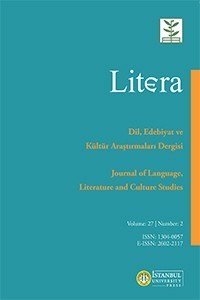Traveler Writer, Romanesque Traveler: A Travel Literature Phenomenon
The French adjective “romanesque”, which derives from the French word for “novel” and which means, in a broader sense, something out of the ordinary or something that derives from dream and imagination can be taken as a principal term to understand the situation of the traveler writer who leaves her/his home to discover beyond the limits of her/his habitual sphere. Travel writing offers, at that point, a notable prospect regarding the reception of the reality when it comes to have an experience in an unknown place with unpredictable conditions. In this sort of writing, the space and the personality take part in an eventual and exclusive relation under the condition of strangeness related to the circumstances of elsewhere and to the changing individual state of the traveler. Thus, an ordinary habitant becomes, first, traveler when s/he leaves the home, then, becomes traveler writer when s/he reports her/his experience, finally, “romanesque traveler” when her/his psychical travel experience gives a wordily result through creating a new world in which the traveler writer takes the role of attentive observer who tends to see in things the unseen, the hidden, the imaginative and the sensational. By referring to the literary works, with the theme “travel”, that have been realized throughout the twentieth and the twenty-first centuries, this paper aims to show a possible conceptual association and a consecutive relation that occur between the titles “traveler writer” and “romanesque traveler” as a phenomenon of travel literature.
Keywords:
Travel literatur, comparative literature, the twentieth century literature, the twenty-first century literature poetics of space,
___
- Batur, E. (2011). Yolcu. İstanbul: Kırmızı Yayınları.
- Bouvier, N. (2001). L’usage du monde. Paris: Éditions Payot&Rivage.
- Gürsel, N. (2013). Bir avuç dünya. İstanbul: Doğan Kitap.
- Kpomassie, T.-M. (1981). L’Africain du Groenland. Paris: Flammarion.
- Maréchaux, L. (2017). Écrivains voyageurs: Ces vagabonds qui disent le monde. Barselona: Éditions Arthaud.
- Onfray, M. (2016). Théorie du voyage: poétique de la géographie. Sant Andreu de la Barca: Librairie Générale Française.
- Richemont, B. de (2015). Manifeste vagabond. Paris: Presses de la Rennaissance.
- Roy, G. (2012). La Détresse et l’Enchantement. Cap-Saint-Ignace: Boréal.
- Segalen, V. (2018). Essai sur l’exotisme. Paris: Librairie Générale Française.
- Tesson, S. (2017). Éloge de l’énergie vagabonde. Malesherbes: Éditions des Équateurs.
- Başlangıç: 1954
- Yayıncı: İstanbul Üniversitesi
